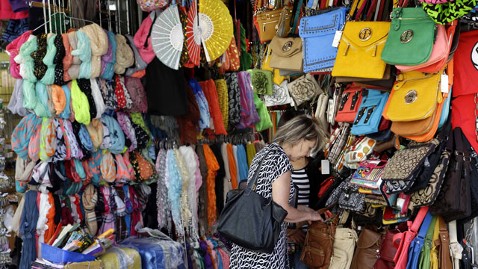NYC Considers Fining Buyers of Knock-Off Goods

Seth Wenig/AP Photo
For years police in New York City have been chasing the guys on Canal Street in lower Manhattan selling phony Louis Vuitton handbags and $20 Rolex watches, but it hasn't stopped the counterfeit trade. Now the New York City Council is considering going after the customer.
"We've got to let people know that hey if you engage in this activity you're committing a crime and I think that's the only way to scare people," said Councilwoman Margaret Chin at a hearing today of the Public Safety Committee.
Chin is sponsoring a bill that would punish the buyers of knock-off goods with a fine of up to $1,000 and up to a year in jail.
"For law abiding citizens, when they know it's against the law, they'll stop," Chin said.
Prosecutors and some council members found the proposed legislation too harsh and it lacks support from Mayor Michael Bloomberg.
"We are concerned that enforcement of such a prohibition could deter both New Yorkers and tourists from shopping for legitimate goods," said Kathleen Magee, director of the Mayor's Office of Special Enforcement.
Advocates say more needs to be done to crack down on counterfeits, which cost the city $1 billion in annual tax revenue. And, they argue, the punishment being proposed in New York works elsewhere.
"In France if you are caught not just purchasing, buying, but carrying a counterfeit anything you can go to jail and be fined up to €360,000," said Valerie Salembier, former publisher of Harper's Bazaar who now runs the nonprofit Authentics Foundation.
"Passing this legislation will act as a deterrent to those people who come to Chinatown solely to buy fakes," she said.
Susan Scafidi, who directs the Fashion Law Institute at Fordham Law says anti-counterfeiting efforts to date have focused on the supply side.
"Law enforcement officials have essentially been fighting with one hand tied behind their backs," Scafidi said. "This bill would give them new authority - the equivalent of targeting johns as well as prostitutes."
Even if the bill passes, which appears unlikely, Scafidi doubts police would be rounding up tour groups in Chinatown. But she does see value in educating consumers.
"If buying a counterfeit becomes criminal act, rather than a recreational activity that carries a frisson of danger like ziplining or skydiving, it's likely that fewer consumers will decide to bag a fake," she said.